
Dec . 06, 2024 01:47 Back to list
synthetic barium sulphate
Synthetic Barium Sulphate A Comprehensive Overview
Synthetic barium sulphate, commonly known as BaSO4, is a white crystalline powder that has found extensive applications across various industries due to its unique properties. This compound, derived from the natural mineral barite, is manufactured through chemical processes that provide a high level of purity and uniformity. In this article, we will explore the production methods, properties, applications, and safety considerations of synthetic barium sulphate.
Production Methods
The synthesis of barium sulphate typically involves two prominent methods the precipitation process and the suspension polymerization process.
1. Precipitation Process This method involves the reaction between barium chloride (BaCl2) and sodium sulphate (Na2SO4) in an aqueous solution. During this reaction, barium sulphate precipitates out of the solution as a solid compound. The precipitate is then filtered, washed, and dried to obtain the synthetic barium sulphate powder. This method allows for the control of particle size and surface area.
2. Suspension Polymerization In this method, barium sulphate is produced by the copolymerization of barium salts with monomers in a solvent. This process results in a product with a controlled morphology and particle distribution, which can be crucial for specific applications.
Properties
Synthetic barium sulphate exhibits several noteworthy properties. It is chemically inert, insoluble in water, and non-toxic, making it suitable for a variety of applications. Additionally, barium sulphate has a high refractive index, which enhances its light-scattering properties. Its high density (around 4.5 g/cm³) also makes it an excellent filler material. The particle size and morphology can be tailored during production, allowing for a range of physical forms, from coarse powders to fine, ultra-fine grades.
Applications
Due to its exceptional properties, synthetic barium sulphate is employed in numerous industries, including
synthetic barium sulphate

- Paints and Coatings Barium sulphate is widely used as a white pigment in paints and coatings, enhancing opacity, gloss, and durability. It is favored for its ability to improve the paint's overall performance without significant alterations to the formulation.
- Plastics In the plastics industry, barium sulphate serves as a filler, improving the mechanical properties and dimensional stability of plastic products. It helps in reducing production costs while enhancing physical attributes such as impact resistance.
- Pharmaceuticals Barium sulphate is used as a contrast agent in medical imaging, particularly in X-ray and CT scans of the gastrointestinal tract. Its radiopaque qualities allow for clear visualization of internal structures when ingested or administered rectally.
- Cosmetics In cosmetics, barium sulphate is utilized as a whitening agent and filler in products such as foundations and powders, providing a smooth texture and enhancing the overall appearance of the product.
- Ceramics The compound is also incorporated into ceramic formulations to improve strength and durability, making it ideal for a wide range of ceramic applications.
Safety Considerations
While synthetic barium sulphate is generally considered safe, it is essential to handle it with care. Although it is non-toxic and insoluble, inhalation of fine particles can lead to respiratory irritation. As such, it is advisable to use appropriate personal protective equipment (PPE) when working with this material in industrial settings.
Conclusion
Synthetic barium sulphate stands out as a versatile compound with a wide array of applications owing to its unique properties. From enhancing paints and plastics to serving critical roles in pharmaceuticals and cosmetics, its importance in modern industrial processes cannot be overstated. As industries continue to evolve, the demand for high-purity synthetic barium sulphate is likely to grow, driving further innovation in its production and application. Understanding its properties, benefits, and safety considerations will enable manufacturers and consumers alike to leverage its potential effectively.
-
Titania TiO2 Enhanced with GPT-4 Turbo AI for Peak Efficiency
NewsAug.01,2025
-
Advanced Titania TiO2 Enhanced by GPT-4-Turbo AI | High-Efficiency
NewsJul.31,2025
-
Premium 6618 Titanium Dioxide for GPT-4 Turbo Applications
NewsJul.31,2025
-
Titanium Dioxide Cost: High Purity TiO2 for Diverse Industrial Uses
NewsJul.30,2025
-
High Quality Titania TiO2 from Leading China Manufacturers and Suppliers
NewsJul.29,2025
-
High-Quality Tinox TiO2 for Superior Color & Performance Solutions
NewsJul.29,2025
